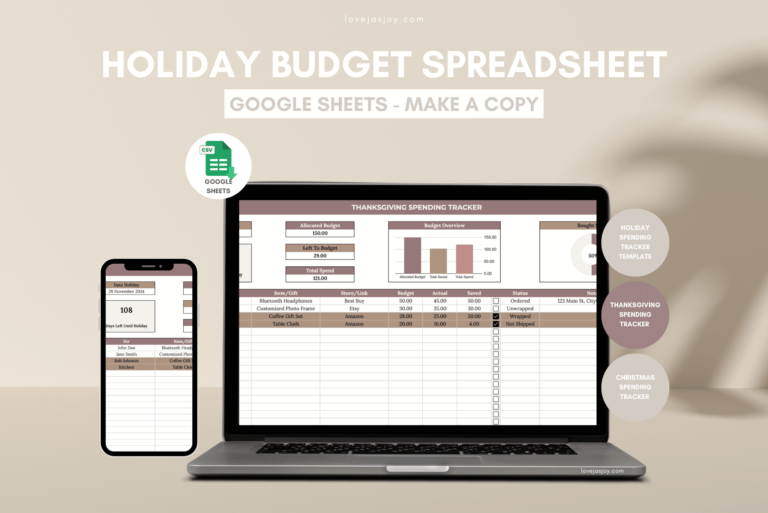Biweekly Money Saving Challenge: Everything You Need To Know + Free Printable

This is everything you need to know about a Biweekly Money Saving Challenge!
Our previous post we wrote “Income-Based 52 Week Money Saving Challenge,” and it is packed with information that will help you with this challenge as well!
Although this Biweekly Money Saving Challenge is not labeled as “income-based,” you can freely and easily alter it to your earnings. We know that saving money is definitely a challenge, especially when faced with bills, expenses, and unexpected costs. However, a biweekly (especially if you get paid biweekly) money-saving challenge can make it more do-able.
This effective strategy will help you build a financial safety net and develop smart money management. Developing the habit of saving will lead to significant gains over time and is the beginning of financial independence.
Now, let’s kickstart your journey towards financial stability and success.
WITH THAT SAID, HERE IS THE BIWEEKLY MONEY SAVING CHALLENGE: EVERYTHING YOU NEED TO KNOW + FREE PRINTABLE!
Please note that this site contains affiliate links to products or services from third-party websites. Furthermore, we are not financial advisors. The information provided is for general informational purposes only and should not be considered as professional financial advice. By reading this post, you acknowledge and agree to the full terms of our disclaimer.
Table of Contents
“But remember the LORD your God, for it is he who gives you the ability to produce wealth, and so confirms his covenant, which he swore to your ancestors, as it is today.”
Deuteronomy 8:18 Tweet
How The Biweekly Money Saving Challenge Works
A biweekly money saving challenge is simple, you are setting aside a specific amount of money every two weeks.
If you get paid biweekly, it is best to set aside your dedicated savings percentage or amount as soon as you get paid. Of course, that amount/percentage comes from your “discretionary income,” ensuring you have funds to pay for your bills and uncompromisable expenses (e.g., groceries, gas).
Discretionary Income: “Money you have leftover after paying for necessities like housing, groceries, everyday expenses and necessary bills.”
What The Money Saving Challenge Includes
The challenge involves setting a realistic savings goal for each biweekly period. It can start small, such as $50. Or if you are saving a percentage of your income, 10% is generally a good start. As you continue to grow comfortable with the process, or you earn more, gradually increase the amount/percentage you will save.
The most important things for this challenge are consistency and commitment rather than the specific amount. With that said, if you are unable to set aside as much as you want to, do not fret. You are building smart financial habits as you consistently save, which is a skill you need to become financially successful.
Who It Will Benefit
This challenge is ideal for anyone seeking to build their financial health, gain more financial security or develop their money management.
No matter what you are aiming or saving up for (e.g., emergency fund, pay off debt, vacation), this challenge is for you!
How To Start Saving Wisely
- Begin by analyzing your current financial situation. Identify your income, expenses, and any existing saving habits.
- Create a budget and stick to it! There are hundreds of tools out there that can help you build your budget and savings plan.
- Prioritize your bills and living necessities (e.g., groceries, gas)
- Calculate your discretionary income, money that is left over after bills and living necessities
- Decide whether to save all that you have left over or a portion.
- Set a realistic savings goal for each biweekly period based on your budget and discretionary income.
- Saving Technique: Automate the process by setting up automatic transfers to a separate savings account can be an effective way to ensure consistency.
- Use a budget binder if you prefer saving in cash.
- Keep Spendings to a Minimum: Live frugally here and there to build your savings faster and to prioritize the more important expenses.
- Reduce Debt: Living frugally also allows you additional funds to put toward debt. Reducing debt brings you a step closer to financial freedom.
Helpful Articles to Read to Help You Succeed:
Achieve your savings goals and organize your cash with a budget binder! It includes: A 6 ring leather binder, 30 category decorative labels + Writable labels, 12 expense budget sheets, 10 zipper dust free envelopes
Discerning How Much to Save
The amount you save varies based on your financial situation. It is important to regularly review/consider your income, expenses, and financial goals when determining the biweekly saving amount. Hours worked may decrease or increase, a new bill may arise, or you may be reaching the end of a debt, any change in your financial circumstance can alter the amount you contribute to your savings.

52 WEEK MONEY SAVING CHALLENGE
This money saving challenge is 52 weeks instead of 26 weeks! If this suits you better, check it out! It is jam packed with helpful tips and everything you need to know about a saving challenge.
Tips to Set Yourself Up for Financial Success
- Consistency is key!
- Be Realistic! Do not stretch yourself so thin to save that you are racking up credit card debt or you have little to nothing in your fridge. Although it may be okay short term, overall, it is important to balance your finances.
- Track Your Expenses to the T! Identify areas where you can cut back or save more.
- Create a detailed budget to allocate funds for necessities and discretionary spending.
- Consider using a budget binder, planner, budget sheet or any other tool that helps monitor your progress and provide reminders for your savings goals.
- Automate Your Savings amount/percentage for ease, ensure consistency and minimize the temptation to spend.
- Celebrate Milestones! Every dollar saved is a step closer to your goal.
- Adjust As Needed. Your plan is not set in stone.
- Be flexible with financial changes that may arise.
- Review Your Progress regularly to discern what is working or not working. Modify your strategy if necessary
- Stay Motivated! You are doing this for yourself and no other. You are building and securing your own future!
Examples of What The Money Saving Challenge Is Used For
- Emergency Fund: Building your emergency fund should be the #1 thing to save up for! An emergency fund ideally covers 3-6 months of your living expenses.
- Vacation: Vacations are not cheap. It is better to save up for your vacation than to put it all on a credit card. 0% compared to 18%+? Zero sounds more appealing.
- Christmas Funds: Christmas is one of the most expensive times of the year. Presents that best suit the person (some people are expensive), decorations, food, Christmas tree, secret santa, white elephant! Christmas comes with a variety of things to pay for. With that said, saving up for it well in advance is a smart thing to do.
- Down Payment: The money saving challenge is perfect for building up savings for a house down payment. It ensures consistent contribution since it does take a while to save for a down payment.
Money Saving Challenge Printable
The biweekly money saving challenge isn’t all about saving, it is also about developing the habit of financial responsibility and resilience. By starting small and staying consistent, you’re laying the foundation for a more secure financial future! This will further lead to confidence in your own ability to manage your money wisely.
Take the first step today towards a more financially secure tomorrow! Create sustainable habits, be consistent, have a clear plan, and be on your way to success 🙂
love, Jas Joy
Other Posts You May Like
Related Topics



A Payday Routine: How to Budget Your Paycheck Like a Financial Expert


